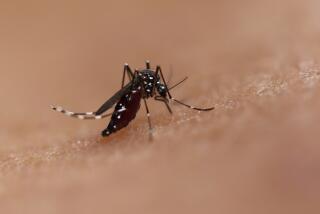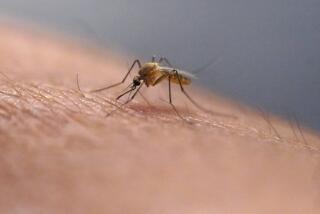Health officials confirm first West Nile virus death in L.A. County this year
A South Bay resident has died from a neuroinvasive illness caused by West Nile virus, marking the first confirmed death this year from the mosquito-borne disease in Los Angeles County.
Public health officials confirmed Wednesday that the patient was hospitalized and died from a West Nile virus-associated illness that affects the central nervous system but did not provide details about the person’s age or when they got sick.
“West Nile virus continues to be a serious health threat to residents in Los Angeles County,” Dr. Muntu Davis, the Los Angeles County health officer, said in a statement. “We encourage residents to check for items that can hold water and breed mosquitoes, both inside and outside their homes, and to cover, clean or clear out those items. Residents should protect themselves from disease spread by mosquitoes by using EPA-registered mosquito repellent products, especially during the peak mosquito season, which lasts from June to November in Los Angeles County.”
This year, California has seen at least 112 confirmed human cases of West Nile, including three other deaths in Amador, Fresno and Imperial counties. There have been nine documented cases in L.A. County, excluding Long Beach and Pasadena, where cases are identified by local health departments.
West Nile virus first emerged in L.A. County in 2004, and the county has seen increased levels of virus activity for the last six years, including in 2017 when there were 27 confirmed deaths related to the virus, according to county data.
The majority of people infected with West Nile virus don’t feel sick. About 1 in 5 people infected develop a fever and other minor symptoms, according to the Centers for Disease Control and Prevention. One in 150 people infected develop serious illness affecting the central nervous system, such as encephalitis — which causes inflammation of the brain — or meningitis, which causes inflammation of the membranes that surround the brain and spinal cord, according to the CDC.
There is no vaccine or specific antiviral treatments for West Nile virus infection. Recovery from severe illness can take several weeks to months, and some effects to a person’s central nervous system might be permanent, according to the CDC.
More to Read
Sign up for Essential California
The most important California stories and recommendations in your inbox every morning.
You may occasionally receive promotional content from the Los Angeles Times.











